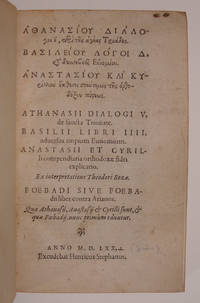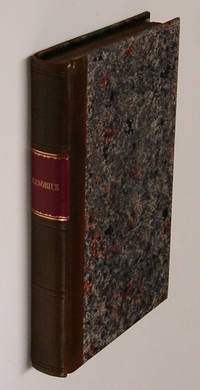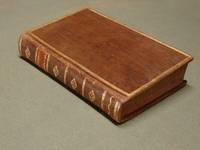
Q. Horatii Flacci Odarum sive Carminum libri quatuor. Epodon liber unus, cum annotatiunculis quam antea auctoribus in margine adiectis, quae brevis commentarii vice esse possint. Nicolai Perotti libellus non infrugifer de metris Odarum Horatianarum. (Bound with:) Q. Horatii Flacci Epistolarum libri duo. Sermonum sive satyrarum libri duo, ad Mecaenatem. Ars poetica, ad Pisones. cum annotatiunculis quam antea auctoribus in margine adiectis, quae brevis commentarii vice esse possint. (And:) Iunii Iuvenalis Aquinatis Satyrae decem et sex. Cum annotatiunculis in margine adiectis, quae brevis commentarii vice esse possint. (And:) Auli Persii Flacci Satyrae sex. Cum annotatiunculis in margine adiectis, quae brevis commentarii vice esse possint.
de HORATIUS
- Usado
- Estado
- Ver descripción
- Librería
-
AMSTERDAM, Netherlands
Formas de pago aceptadas
Sobre este artículo
Reseñas
(¡Iniciar sesión or Crear una cuenta primero!)
Detalles
- Librería
- Antiquariaat Fragmenta Selecta
(NL)
- Inventario del vendedor #
- 120259
- Título
- Q. Horatii Flacci Odarum sive Carminum libri quatuor. Epodon liber unus, cum annotatiunculis quam antea auctoribus in margine adiectis, quae brevis commentarii vice esse possint. Nicolai Perotti libellus non infrugifer de metris Odarum Horatianarum. (Bound with:) Q. Horatii Flacci Epistolarum libri duo. Sermonum sive satyrarum libri duo, ad Mecaenatem. Ars poetica, ad Pisones. cum annotatiunculis quam antea auctoribus in margine adiectis, quae brevis commentarii vice esse possint. (And:) Iunii Iuvenalis Aquinatis Satyrae decem et sex. Cum annotatiunculis in margine adiectis, quae brevis commentarii vice esse possint. (And:) Auli Persii Flacci Satyrae sex. Cum annotatiunculis in margine adiectis, quae brevis commentarii vice esse possint.
- Autor
- HORATIUS
- Estado del libro
- Usado
- Palabras clave
- (Oude Druk) (Rare Books) Dichtkunst Horace Horatius Horaz Juvenal Juvenalis Latin literature Persius Poesie antike altertum antiquity poetry römische Literatur
- Catálogos del vendedor
- Old and Rare books;
Términos de venta
Antiquariaat Fragmenta Selecta
Books may be returned for any reason within 14 days of receipt. The book price will be refunded, if the book is returned in the same condition as sent, and packed, shipped and insured as received. A full refund including shipping costs will follow only if an item arrives misdescribed or damaged. Shipping estimates are based on books weighing 4.4 LB or 2 KG. If your book order is heavy or oversized, we will email you to let you know that extra shipping is required. All books are in good antiquarian condition, unless otherwise described. Items offered are subject to prior sale.
Sobre el vendedor
Antiquariaat Fragmenta Selecta
Sobre Antiquariaat Fragmenta Selecta
Glosario
Algunos términos que podrían usarse en esta descripción incluyen:
- Leaves
- Very generally, "leaves" refers to the pages of a book, as in the common phrase, "loose-leaf pages." A leaf is a single sheet...
- Morocco
- Morocco is a style of leather book binding that is usually made with goatskin, as it is durable and easy to dye. (see also...
- Gilt
- The decorative application of gold or gold coloring to a portion of a book on the spine, edges of the text block, or an inlay in...
- Folio
- A folio usually indicates a large book size of 15" in height or larger when used in the context of a book description. Further,...
Categorías de este libro
Also Recommended
-

¡Ahorra un 10% en cada compra!
Únete al Biblioclub y empieza a ahorrar un 10% enn todas tus compras.
$29.95 / Año






